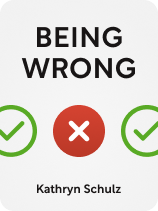

This article is an excerpt from the Shortform book guide to "Being Wrong" by Kathryn Schulz. Shortform has the world's best summaries and analyses of books you should be reading.
Like this article? Sign up for a free trial here.
How can making mistakes be beneficial? What if being wrong wasn’t necessarily something to fear—but something to embrace?
In Being Wrong, Kathryn Schulz explores the surprising benefits of making mistakes. She challenges our conventional wisdom about errors and presents a compelling case for why we should reconsider our relationship with being wrong.
Read on to discover the unexpected ways that mistakes can help us survive, find truth, and even inspire joy and wonder.
The Benefits of Making Mistakes
The idea that being wrong about something can be good goes against what most of us are brought up to believe. We’re told that making mistakes is “only human,” but we’re also taught that making mistakes is a sign that we’re stupid or have low moral standing. This is wrong, Schulz argues. She says that what’s important is that we accept and learn from our mistakes because usually our mistakes don’t hurt us as much as reacting to them poorly does. She details three benefits of making mistakes that we’ll miss if we don’t look on the bright side of error.
Benefit #1: Mistakes Can Help Us Survive
Right and wrong are both essential aspects of human cognition, says Schulz. Being “right”—assuming that beliefs are true and acting on them accordingly—is a survival tool we inherited from our prehistoric peers. After all, if you’re in the savannah and hear a noise you believe to be a lion, it’s better to act on that belief without question than to wait and study the matter in depth, increasing your risk of turning into a snack. As a result, being right feels good, and evolution rewards that feeling. However, Schulz argues that our ability to be wrong is also a survival skill in that it lets us imagine a different world than the one we live in—a world that, while technically “wrong,” helps us look past our limited perceptions to solve problems.
For example, imagine that your car—which you thought was running fine—breaks down on the highway. At once, your mind starts generating theories about why your car malfunctioned. Most of these thoughts will be just as incorrect as your prior belief that your car was in good order, but they let your mind work on solutions to various contingencies until you have more data. This same impulse let our ancient ancestors imagine better hunting ground past the horizon, whether or not it was actually there, driving the human race to spread across the globe.
Since we like to cling to the feeling that we’re right, the conflicts we experience aren’t between “right” and “wrong,” but between opposing views of “right,” writes Schulz. Our society doesn’t even afford us a healthy common language for admitting to mistakes without associated shame. Instead, we prioritize being right above all else while happily pointing out the mistakes of others. When we’re forced to confront our errors, we’ll either shift the blame or disassociate ourselves from our wrongness with the classic line, “Mistakes were made.” This robs us of the lessons we might learn from opening ourselves to the chance that we’re wrong, thereby harming relationships between people, cultures, religions, and nations.
Benefit #2: Mistakes Can Help Us Find the Truth
If feeling that we’re right is so ingrained in our thinking, how can we engage with being wrong in a way that doesn’t undermine everything we believe? Schulz holds up modern science as an example of how to view being wrong as a stepping stone toward truth. The scientific method of theory and experimentation embraces the possibility of error in a way that shines a light on how we can harness mistakes in other areas.
The way that science does this is by inverting the normal human mode of thinking. Whereas we, as individuals and institutions, begin from the premise that our ideas are true until proven otherwise, scientists deliberately assume that any new theory or discovery may be false until it’s been independently tested multiple times under a multitude of conditions. Schulz points out that, even when a new scientific idea has survived enough tests to be widely accepted, the testing and refinement of the theory never stops. The errors that do crop up along the way don’t derail scientific progress—instead, we see them as signposts toward the truth.
(Shortform note: Because, as Schulz says, the sciences are open to admitting mistakes and re-evaluating their positions, people sometimes disregard a scientific concept they don’t like by saying, “it’s only a theory.” However, there’s a difference between the popular use of the word “theory” to mean a tentative guess and the scientific definition of the word “theory” to mean a well-tested and substantiated system of explanations about the world. In A Brief History of Time, Stephen Hawking lists the essential qualities of a good theory: It explains observations made in the past, it successfully predicts what will happen in the future, and—as Schulz also points out—its predictions can be tested and disproved in case they turn out to be wrong.)
The Paradigm Cycle
Schulz writes that the mistakes in current scientific theories don’t mean they’re absolutely wrong. Science teaches that mistakes can be useful guesses at the truth until a better guess comes along. New theories often overturn older beliefs, such as the idea that the Earth is the center of the universe. This was replaced by the Copernican theory that placed the sun at the universe’s center—which is also untrue, but less so than the previous model, since the sun is the center of the solar system, if not the universe as a whole. Many scientific theories we hold true today will no doubt be replaced by others.
(Shortform note: The relationship between scientific progress and acknowledging that current theories may be wrong is often more nuanced than Schulz suggests. In The God Equation, Michio Kaku describes the history of science through theories that encompass ideas that came before instead of replacing them entirely. For instance, Einstein’s theory of relativity didn’t prove Newton’s earlier theories wrong—he simply showed that Newton’s ideas were incomplete by explaining observations that Newton’s laws don’t account for, such as how objects behave as they approach the speed of light. Newton’s theories are still considered “right” in that they’re useful approximations of the laws of physics that govern our everyday experience.)
Given how greatly human knowledge has changed since we first learned to pass knowledge along, it would be foolish to assume that what we currently “know” is the absolute truth—and yet, in order for society to function, we have to act as if our current beliefs are correct while keeping our minds open to the ways they may be wrong. Schulz says that we see this pattern of new paradigms of thought replacing older models in every field of understanding. Political models replace older structures, as democracy replaced the monarchies of old. Parenting methods have seen radical changes, as quickly as from one generation to the next. Even religions re-evaluate themselves as interpretations of sacred texts slowly shift over time.
(Shortform note: As with scientific progress, the new societal paradigms Schulz discusses never entirely unseat the old ones, so “right” and “wrong” are always subjective when it comes to discussing social models. For example, in Reinventing Organizations, Frédéric Laloux goes into detail about the shift in organizational structures over time, from the authoritarian kingdoms of old to modern corporate structures and beyond. Even though Laloux touts a specific “visionary” organizational structure as the wave of the future, he points out that older organizational structures can still be the correct models to follow given certain circumstances. In other words, the replacement of one “wrong” with another “right” is never as total as Schulz suggests.)
Benefit #3: Mistakes Can Inspire Joy and Wonder
Beside being useful as a tool to advance human understanding, the fact that our ideas about the world can be wrong is something that brings joy to all of our lives. If you find this hard to believe, consider that the disparity between how each of us views the world from each other—a multitude of opinions that cannot all be “right”—is the genesis of humor, art, and the quirks that make each of us unique.
Some people believe the whole point of humor is to point out mistakes in a way that’s pleasant and easy to digest. At its basic level, such as classic “pratfall” humor, we laugh at other people’s mistakes, and—if we’re strong enough to take a joke—we laugh at errors of our own. Schulz points out that more complicated humor also revolves around harnessing wrongness—a comedian says something that creates an expectation, then shows that expectation to be wrong in a way that briefly confuses the listener until they “get the joke.” Not all humor works this way, but enough of it does that it’s one of comedy’s defining traits, as epitomized by the medieval “court jester” who was the only one allowed to make fun of the king.
In a larger sense, all artistic creation exploits the same loophole of “wrongness”—the mismatch between different perceptions—that humor uses to make a joke. Schulz writes that, while we usually think of being wrong as a mistake, art takes us into the realm of error on purpose. Art shows worlds that don’t exist, perhaps through the distortion of a painting, the soundscape of a song, or the twist of an engrossing story. Art lets us explore the unreal—the wrong—without any of the baggage we attach to misconceptions in our day-to-day lives. Beyond that, art lets us see other people’s foibles through our own eyes. When we can connect others’ wrongness with our own, we learn empathy in a way that being “right” can’t teach.
Perhaps the greatest benefit to being wrong is that the unique ways in which we’re wrong are what let us stand out as individuals. Schulz suggests that our idiosyncratic worldviews, each of which is wrong in its own way, distinguish us as separate and valuable. To understand this, imagine if each of us was objectively right all the time. We’d share the same views; we’d think the same thoughts. We wouldn’t be human—instead, we’d be machines, each of us running the same operating system. Feelings like mystery, wonder, and surprise wouldn’t exist in the world of “being right.” It’s only by being wrong and envisioning a world that doesn’t exist that we open the door to such human fundamentals as imagination, aspiration, and hope.

———End of Preview———
Like what you just read? Read the rest of the world's best book summary and analysis of Kathryn Schulz's "Being Wrong" at Shortform.
Here's what you'll find in our full Being Wrong summary:
- Why you shouldn’t try to completely avoid making mistakes
- The reasons why you get things wrong
- How to make mistakes without falling victim to shame and denial






